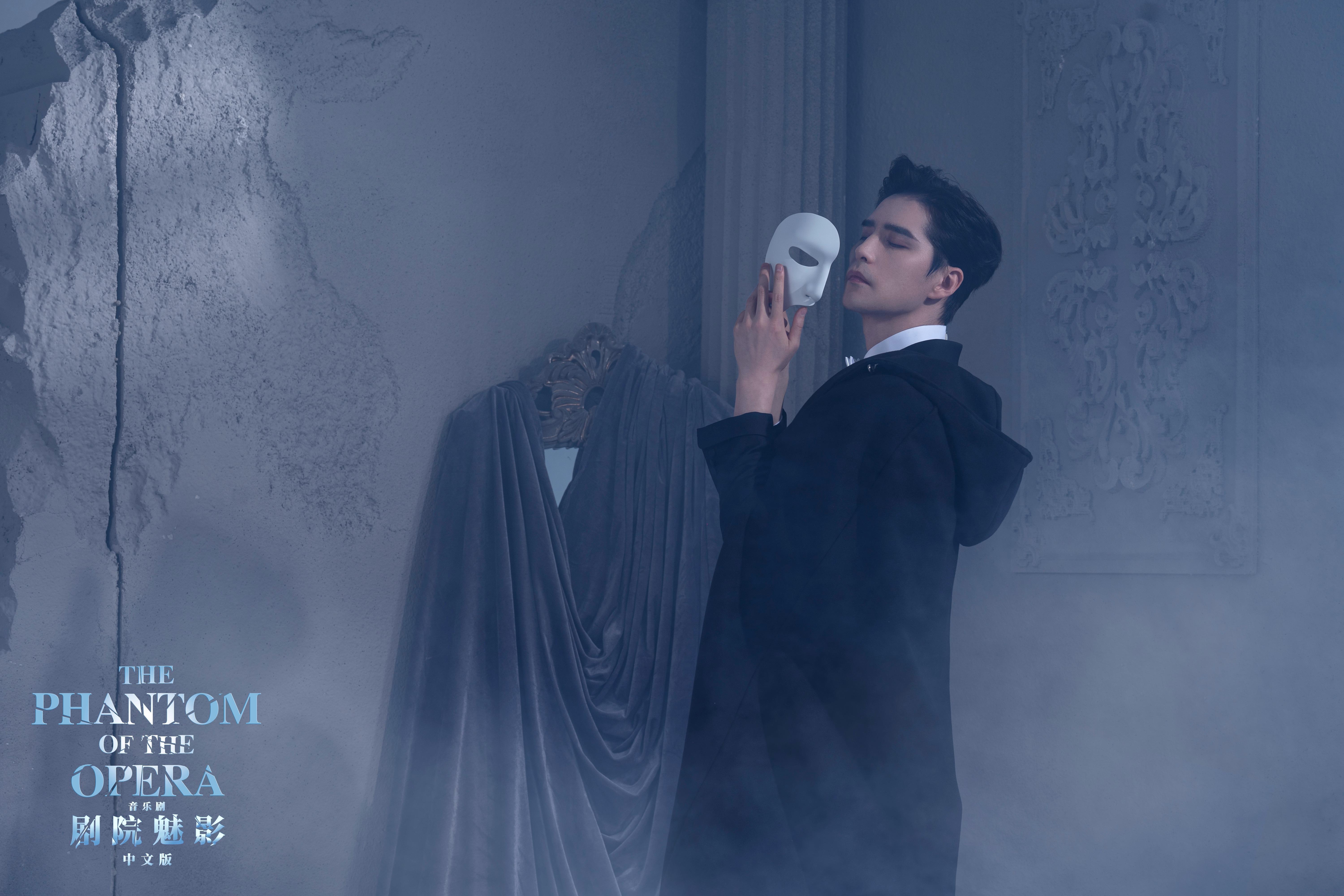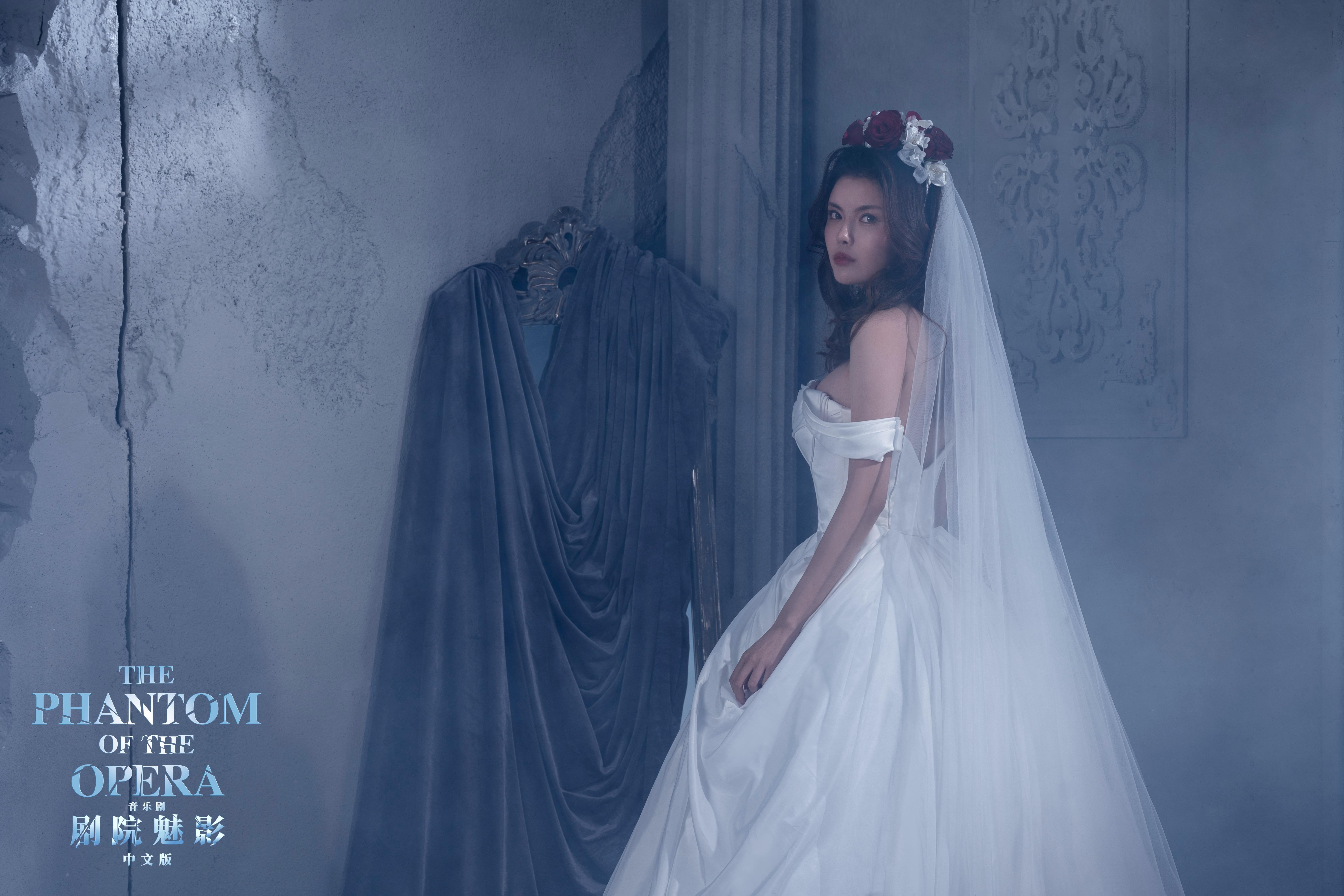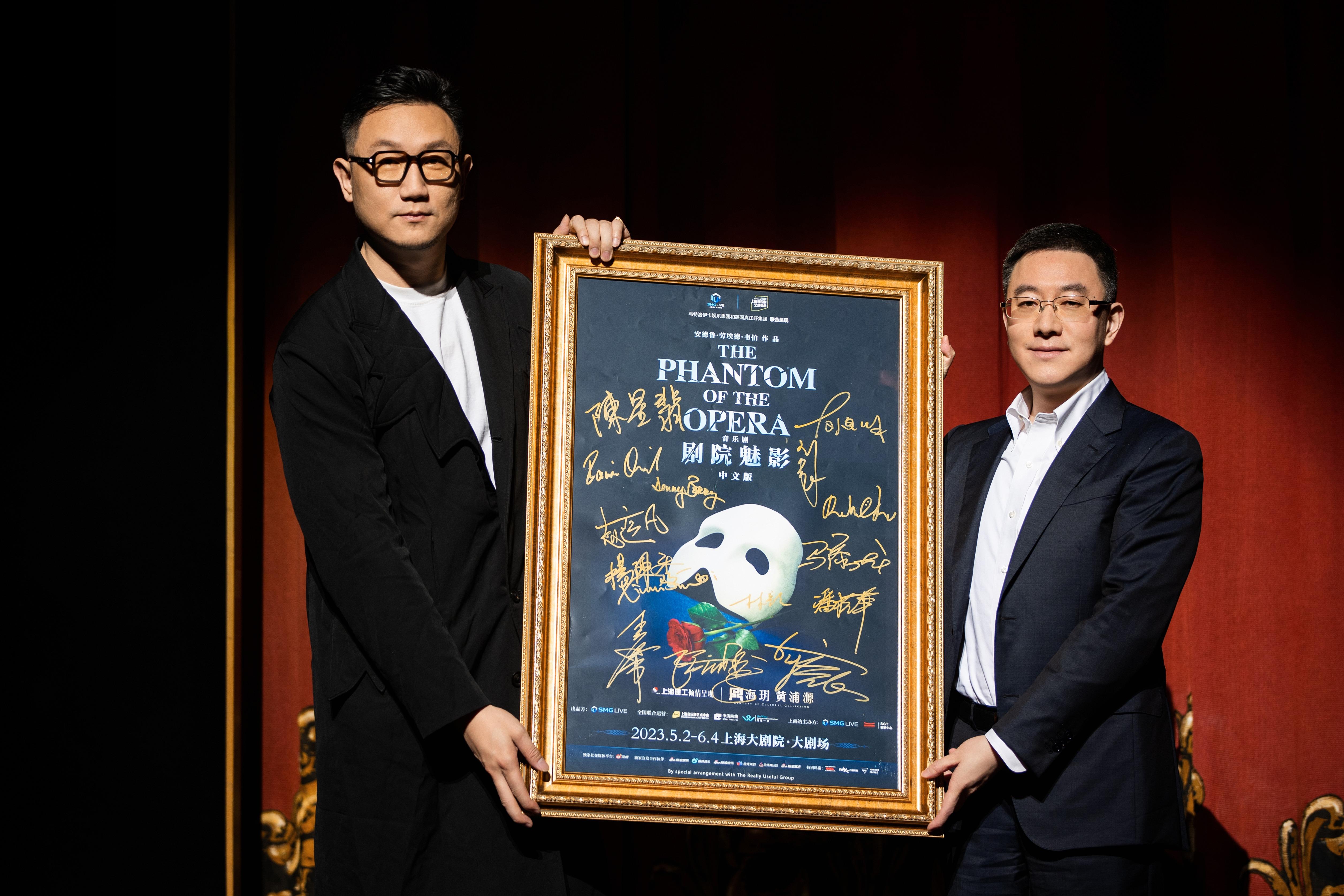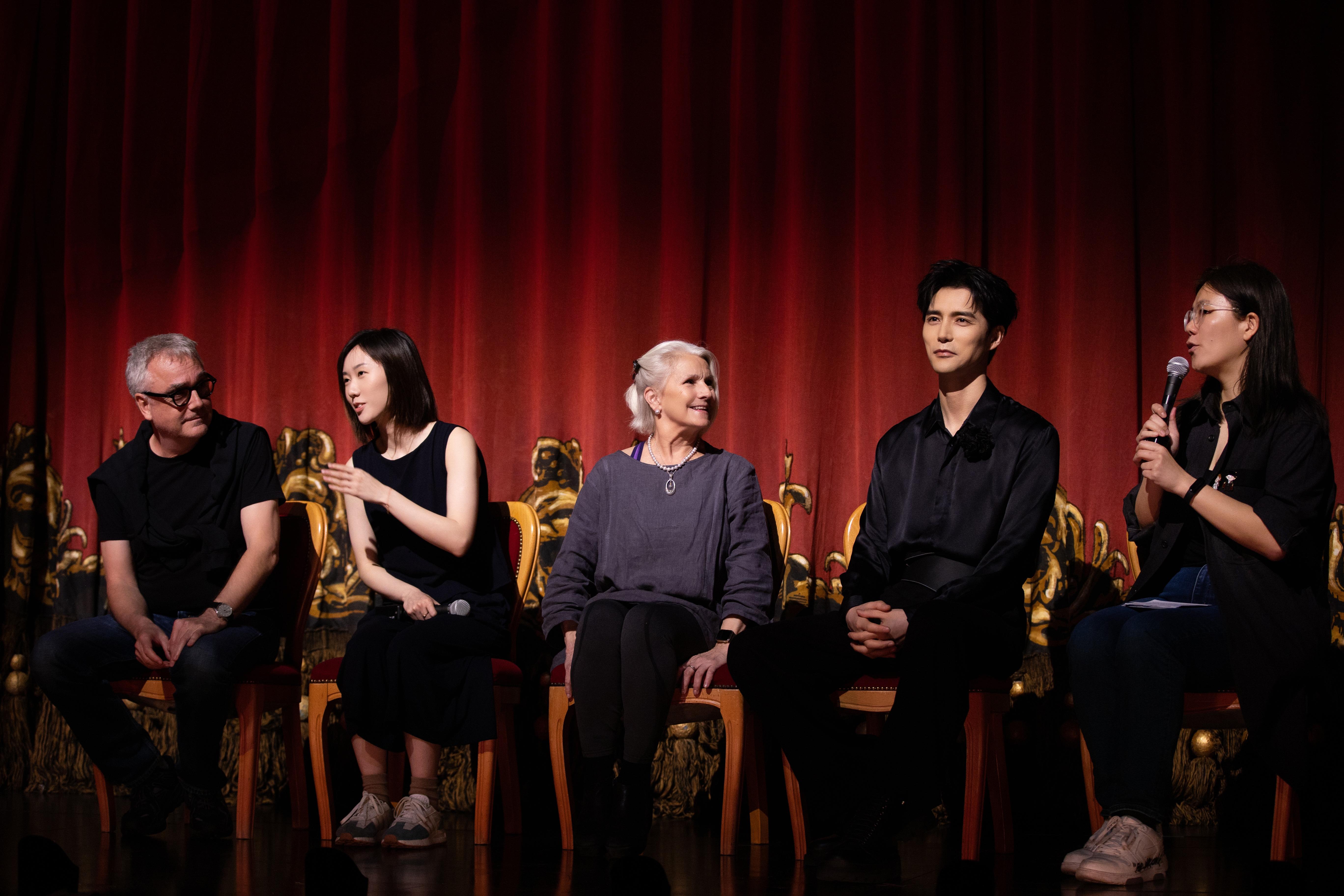Chinese version of popular opera ready to thrill audiences with hauntingly romantic tale, Zhang Kun reports.
 The stage is set for the Mandarin production of the Phantom of the Opera at the Shanghai Grand Theatre. (PHOTO PROVIDED TO CHINA DAILY)
The stage is set for the Mandarin production of the Phantom of the Opera at the Shanghai Grand Theatre. (PHOTO PROVIDED TO CHINA DAILY)
The first Chinese production of the Phantom of the Opera will premiere at the Shanghai Grand Theatre on Tuesday, and theater lovers in China are clearly looking forward to it, if the audience numbers of a recent livestream are anything to go by.
A few days after the Phantom of the Opera had its last curtain call on Broadway on April 16, the Shanghai Grand Theatre, which is behind the first Chinese production of the musical, lit up the musical's signature chandelier at its premises on April 19.
The lighting of the 3-meter-wide chandelier, which has more than 6,000 crystal beads and weighs 1 metric ton, was livestreamed on multiple internet platforms and watched by more than 1 million people.
One of the most popular musical productions in the world, the Phantom of the Opera by Andrew Lloyd Webber is the longest-running show in Broadway history. Since its debut in 1986, the musical has been performed in 85 cities around the world.
 The stage is set for the Mandarin production of the Phantom of the Opera at the Shanghai Grand Theatre, with Ayunga (right) in the title role of the Phantom. (PHOTO PROVIDED TO CHINA DAILY)
The stage is set for the Mandarin production of the Phantom of the Opera at the Shanghai Grand Theatre, with Ayunga (right) in the title role of the Phantom. (PHOTO PROVIDED TO CHINA DAILY)
The Chinese production will be the 18th language the show is performed in.
Two weeks before its premiere, the Shanghai Grand Theatre invited members of the media for a backstage tour. Denny Berry, the executive choreographer for the Chinese edition, who also used to work with the flagship production in New York, told the media that being in Shanghai was "bittersweet" as her colleagues had to "put to bed the flagship production" while she had to be here in another country to bring to life the musical's first Mandarin production.
Stage rehearsals for the Chinese production began on the same day the Phantom of the Opera had its final curtain call at the Majestic Theatre on Broadway.
The Chinese production team consists of more than 120 members, 40 of whom work with the technical department.
 The stage is set for the Mandarin production of the Phantom of the Opera at the Shanghai Grand Theatre, with Lin Han playing Christine Daae in the title role of the Phantom. (PHOTO PROVIDED TO CHINA DAILY)
The stage is set for the Mandarin production of the Phantom of the Opera at the Shanghai Grand Theatre, with Lin Han playing Christine Daae in the title role of the Phantom. (PHOTO PROVIDED TO CHINA DAILY)
According to Rainer Fried, the executive director of the Chinese production, all casting was conducted online in a "nerve-wrecking, long process" due to the pandemic. It was only six weeks ago that more than 40 cast members from the original Webber production landed in Shanghai.
Fried describes the feeling of walking into the rehearsal room and meeting the cast as "emotional, moving and scary", but he expresses satisfaction with the casting choices. "We haven't made a single casting mistake. The actors exceeded expectations completely. I can't speak highly enough of them," he says.
Fried adds that he was especially impressed with the translation team, who stayed close by in the room during the rehearsals in Shanghai, an unusual practice compared to other international productions.
"I realized the great difficulty in translating a show as big as the Phantom into Chinese. … I am grateful for the devoted and passionate translation team. Their input ensured the first Chinese production would be a beautiful show," he says.
 The Chinese edition will premiere at the Shanghai Grand Theatre on Tuesday. It will be the 18th language the show is performed in. (PHOTO PROVIDED TO CHINA DAILY)
The Chinese edition will premiere at the Shanghai Grand Theatre on Tuesday. It will be the 18th language the show is performed in. (PHOTO PROVIDED TO CHINA DAILY)
According to Zhao Chenlin, executive producer of the show, the installation of the stage settings and technical rehearsals required an entire month because of the amount of work involved. She notes that the props and equipment alone filled 22 trucks, and unloading them took three whole nights.
The scene of the secret lake under the Opera Garnier, Zhao points out, is one example of how detailed the settings for the Chinese production are. To achieve a misty, fantasy-like effect on the lake surface, the production crew will use more than 280 candles, dry ice weighing 250 kilograms and 10 smoke machines.
Jill Parker, the assistant costume designer, says that most of the props and costumes were specially made for the Chinese production, with only a small portion inherited from touring productions.
"From handsewn rhinestones to the gowns to elaborate embroideries to layers after layers of fabric, there is not a costume in Phantom that isn't labor-intensive," she says. "Some are so fragile they have to be cleaned by hand after use."
 A news conference was held on April 19 with Rainer Fried (far left), the executive director for the Chinese edition, and executive choreographer Denny Berry (center). (PHOTO PROVIDED TO CHINA DAILY)
A news conference was held on April 19 with Rainer Fried (far left), the executive director for the Chinese edition, and executive choreographer Denny Berry (center). (PHOTO PROVIDED TO CHINA DAILY)
One of the three male actors who will play the title role of the Phantom is Ayunga, who is also the co-producer of the Chinese musical.
The Chinese production of the Phantom of the Opera is of great significance to the future development of China's theater industry, he says, noting that the Japanese edition that premiered in 1988 helped the production company become a leading player in Asia. The Korean edition also left a great impact on the live show business in South Korea.
"We have now planted the seeds, and I believe that with the success of the Chinese Phantom, the musical scene in China will go on to blossom."
If you go
Phantom of the Opera
・ May 2-June 4, Shanghai Grand Theatre, 300 Renmin Avenue, Huangpu district, Shanghai. 021-6386-8686.
・ June 13-July 2, Bay Opera of Shenzhen, 16 Huanle Gangwan, Baoxing Road, Binhai Community, Baoan district, Shenzhen, Guangdong province.
・ July 25-Aug 13, Guangzhou Opera House, No 1 Zhujiang Road West, Tianhe district, Guangzhou, Guangdong province. 020-3839-2888.
Contact the writer at zhangkun@chinadaily.com.cn


